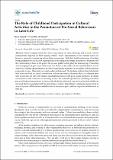Files in this item
The role of childhood participation in cultural activities in the promotion of pro-social behaviours in later life
Item metadata
| dc.contributor.author | Garrod, Brian | |
| dc.contributor.author | Dowell, David | |
| dc.date.accessioned | 2020-07-24T14:30:05Z | |
| dc.date.available | 2020-07-24T14:30:05Z | |
| dc.date.issued | 2020-07-17 | |
| dc.identifier | 269273707 | |
| dc.identifier | fa97e669-e338-4aac-9bda-a08b3b58580c | |
| dc.identifier | 85095608003 | |
| dc.identifier | 000554244900001 | |
| dc.identifier.citation | Garrod , B & Dowell , D 2020 , ' The role of childhood participation in cultural activities in the promotion of pro-social behaviours in later life ' , Sustainability , vol. 12 , no. 14 , 5744 . https://doi.org/10.3390/su12145744 | en |
| dc.identifier.issn | 2071-1050 | |
| dc.identifier.other | Bibtex: su12145744 | |
| dc.identifier.other | ORCID: /0000-0003-4788-5240/work/77893853 | |
| dc.identifier.uri | https://hdl.handle.net/10023/20331 | |
| dc.description.abstract | Cultural organisations often serve as guardians of cultural heritage and, as such, cultural sustainability depends on their ongoing vitality. Many organisations in the cultural sector are, however, presently experiencing intense financial pressures. With their traditional sources of funding being progressively cut off, such organisations are focusing increasingly on monetary donations and the volunteering of time on the part of the general public to help plug the financial gap. Promoting and managing such pro-social behaviours can, however, be costly activities in themselves, so it is critical for cultural organisations to be able to target those segments of the public with the greatest propensity to give. This study sets out to address that need. The findings indicate that individuals who were involved in cultural activities as children are statistically more likely to volunteer their time in later life, not only with cultural organisations but also with good causes in general. In certain circumstances, this is also true of donating money. The cultural organisations benefiting from these pro-social behaviours need not be those with which the individual was involved in their childhood; nor need they be associated with the same form of culture. Importantly, continuous involvement in an activity from childhood into adulthood is not a necessary pre-condition for pro-social behaviour in later life. | |
| dc.format.extent | 16 | |
| dc.format.extent | 270534 | |
| dc.language.iso | eng | |
| dc.relation.ispartof | Sustainability | en |
| dc.subject | Pro-social | en |
| dc.subject | Volunteering | en |
| dc.subject | Donation | en |
| dc.subject | Culture | en |
| dc.subject | Participation | en |
| dc.subject | Children | en |
| dc.subject | H Social Sciences | en |
| dc.subject | 3rd-DAS | en |
| dc.subject.lcc | H | en |
| dc.title | The role of childhood participation in cultural activities in the promotion of pro-social behaviours in later life | en |
| dc.type | Journal article | en |
| dc.contributor.institution | University of St Andrews. School of Management | en |
| dc.identifier.doi | https://doi.org/10.3390/su12145744 | |
| dc.description.status | Peer reviewed | en |
This item appears in the following Collection(s)
Items in the St Andrews Research Repository are protected by copyright, with all rights reserved, unless otherwise indicated.

